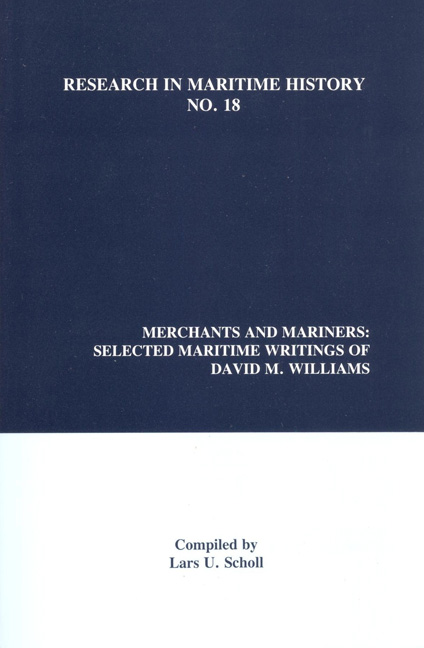Book contents
- Frontmatter
- Contents
- “Introduction”
- “David Malcolm Williams: A Tribute from an Old Friend”
- “David M. Williams and the Writing of Modern Maritime History”
- Writings
- “Abolition and the Re-Deployment of the Slave Fleet, 1807-1811”
- “Liverpool Merchants and the Cotton Trade 1820-1850”
- “The Shipping of the North Atlantic Cotton Trade in the Mid- Nineteenth Century”
- “Merchanting in the First Half of the Nineteenth Century: The Liverpool Timber Trade”
- “James Silk Buckingham: Sailor, Explorer and Maritime Reformer”
- “State Regulation of Merchant Shipping 1839-1914: The Bulk Carrying Trades”
- “Customs Evasion, Colonial Preference and the British Tariff, 1829- 1842”
- “Bulk Passenger Freight Trades, 1750-1870”
- “Henry Mayhew and the British Seaman”
- “Mid-Victorian Attitudes to Seamen and Maritime Reform: The Society for Improving the Condition of Merchant Seamen, 1867”
- '“Advance Notes' and the Recruitment of Maritime Labour in Britain in the Nineteenth Century”
- “The Quality, Skill and Supply of Maritime Labour: Causes of Concern in Britain, 1850-1914”
- “David M. Williams: A Bibliography”
“James Silk Buckingham: Sailor, Explorer and Maritime Reformer”
from Writings
- Frontmatter
- Contents
- “Introduction”
- “David Malcolm Williams: A Tribute from an Old Friend”
- “David M. Williams and the Writing of Modern Maritime History”
- Writings
- “Abolition and the Re-Deployment of the Slave Fleet, 1807-1811”
- “Liverpool Merchants and the Cotton Trade 1820-1850”
- “The Shipping of the North Atlantic Cotton Trade in the Mid- Nineteenth Century”
- “Merchanting in the First Half of the Nineteenth Century: The Liverpool Timber Trade”
- “James Silk Buckingham: Sailor, Explorer and Maritime Reformer”
- “State Regulation of Merchant Shipping 1839-1914: The Bulk Carrying Trades”
- “Customs Evasion, Colonial Preference and the British Tariff, 1829- 1842”
- “Bulk Passenger Freight Trades, 1750-1870”
- “Henry Mayhew and the British Seaman”
- “Mid-Victorian Attitudes to Seamen and Maritime Reform: The Society for Improving the Condition of Merchant Seamen, 1867”
- '“Advance Notes' and the Recruitment of Maritime Labour in Britain in the Nineteenth Century”
- “The Quality, Skill and Supply of Maritime Labour: Causes of Concern in Britain, 1850-1914”
- “David M. Williams: A Bibliography”
Summary
This paper arises out of a research interest in the field of state involvement with shipping, in particular government intervention in the early Victorian period. It was this interest which prompted an examination of the Select Committee on Shipwrecks of 1836 of which James Silk Buckingham was Chairman. This alone would make Buckingham a figure of interest; however, for Buckingham, the chairmanship of this important Committee was but one episode in a full and varied career. Buckingham, a Cornishman by birth, led an exceptional life. Indeed, the diversity of his talents, interests and activities and his participation in many of the major issues and events of his time were such that Buckingham can well be regarded as one of the most remarkable men of the first half of the nineteenth century. The title of this paper which describes Buckingham as sailor, explorer and maritime reformer is highly selective: to reflect fully the breadth of his ability one would have to add author, linguist, journalist, lecturer and politician, for in all these roles he was a significant figure. Despite his wide-ranging impressive talents and an amazing career, Buckingham has been poorly served by historians. But one biography has appeared, some fifty years ago, and that sadly is little known.
The purpose of this paper is twofold. First, to provide a brief outline of Buckingham's life and career, and second, to focus on his role and contribution in the matter of state regulation and safety at sea through his involvement with the Select Committee on Shipwrecks. Like Buckingham himself, the Committee of 1836 has hardly gained the attention it deserves. Looked at in the context of the late 1830s this neglect of the 1836 enquiry is perhaps understandable; the Committee was set up at the fag-end of a parliamentary session, it lasted for less than a month, and its recommendations were ignored by government. However, viewed over a longer perspective in the context of state involvement in merchant shipping during the nineteenth century, the 1836 Committee appears in a wholly more positive light and deserves to be seen as an important milestone in the process which was to make, by the end of the Victorian era, merchant shipping one of the most regulated sectors of economic activity and the merchant seaman the most legislated for group within the labour force.
- Type
- Chapter
- Information
- Merchants and MarinersSelected Maritime Writings Of David M. Williams, pp. 109 - 126Publisher: Liverpool University PressPrint publication year: 2000

